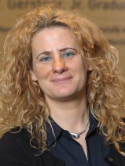Molecular predictors of immunophenotypic measurable residual disease clearance in acute myeloid leukemia Journal Article
| Authors: | Stahl, M.; Derkach, A.; Farnoud, N.; Bewersdorf, J. P.; Robinson, T.; Famulare, C.; Cho, C.; Devlin, S.; Menghrajani, K.; Patel, M. A.; Cai, S. F.; Miles, L. A.; Bowman, R. L.; Geyer, M. B.; Dunbar, A.; Epstein-Peterson, Z. D.; McGovern, E.; Schulman, J.; Glass, J. L.; Taylor, J.; Viny, A. D.; Stein, E. M.; Getta, B.; Arcila, M. E.; Gao, Q.; Barker, J.; Shaffer, B. C.; Papadopoulos, E. B.; Gyurkocza, B.; Perales, M. A.; Abdel-Wahab, O.; Levine, R. L.; Giralt, S. A.; Zhang, Y.; Xiao, W.; Pai, N.; Papaemmanuil, E.; Tallman, M. S.; Roshal, M.; Goldberg, A. D. |
| Article Title: | Molecular predictors of immunophenotypic measurable residual disease clearance in acute myeloid leukemia |
| Abstract: | Measurable residual disease (MRD) is a powerful prognostic factor in acute myeloid leukemia (AML). However, pre-treatment molecular predictors of immunophenotypic MRD clearance remain unclear. We analyzed a dataset of 211 patients with pre-treatment next-generation sequencing who received induction chemotherapy and had MRD assessed by serial immunophenotypic monitoring after induction, subsequent therapy, and allogeneic stem cell transplant (allo-SCT). Induction chemotherapy led to MRD− remission, MRD+ remission, and persistent disease in 35%, 27%, and 38% of patients, respectively. With subsequent therapy, 34% of patients with MRD+ and 26% of patients with persistent disease converted to MRD-. Mutations in CEBPA, NRAS, KRAS, and NPM1 predicted high rates of MRD− remission, while mutations in TP53, SF3B1, ASXL1, and RUNX1 and karyotypic abnormalities including inv (3), monosomy 5 or 7 predicted low rates of MRD− remission. Patients with fewer individual clones were more likely to achieve MRD− remission. Among 132 patients who underwent allo-SCT, outcomes were favorable whether patients achieved early MRD− after induction or later MRD− after subsequent therapy prior to allo-SCT. As MRD conversion with chemotherapy prior to allo-SCT is rarely achieved in patients with specific baseline mutational patterns and high clone numbers, upfront inclusion of these patients into clinical trials should be considered. © 2022 Wiley Periodicals LLC. |
| Keywords: | transplantation, homologous; genetics; leukemia, myeloid, acute; stem cell transplantation; hematopoietic stem cell transplantation; minimal residual disease; neoplasm, residual; remission; remission induction; allotransplantation; acute myeloid leukemia; humans; prognosis; human |
| Journal Title: | American Journal of Hematology |
| Volume: | 98 |
| Issue: | 1 |
| ISSN: | 0361-8609 |
| Publisher: | John Wiley & Sons, Inc. |
| Date Published: | 2023-01-01 |
| Start Page: | 79 |
| End Page: | 89 |
| Language: | English |
| DOI: | 10.1002/ajh.26757 |
| PUBMED: | 36251406 |
| PROVIDER: | scopus |
| PMCID: | PMC10080561 |
| DOI/URL: | |
| Notes: | Article -- The MSK Cancer Center Support Grant (P30 CA008748) is acknowledged in the PubMed record and PDF. Corresponding author is MSK author Maximilian Stahl -- Export Date: 3 January 2023 -- Source: Scopus |
Altmetric
Citation Impact
BMJ Impact Analytics
MSK Authors
-
 371
371Stein -
 1070
1070Giralt -
 655
655Tallman -
 787
787Levine -
 420
420Papadopoulos -
 946
946Perales -
 335
335Barker -
 674
674Arcila -
 587
587Abdel-Wahab -
 52
52Cai -
 71
71Patel -
 618
618Devlin -
 53
53Bowman -
 134
134Cho -
 237
237Roshal -
 22
22Miles -
 138
138Gyurkocza -
 50
50Viny -
 57
57Glass -
 69
69Gao -
 91
91Geyer -
 29
29Getta -
 176
176Shaffer -
 89
89Famulare -
 218
218Papaemmanuil -
 51
51Taylor -
 119
119Goldberg -
 206
206Zhang -
 45
45Dunbar -
 116
116Xiao -
 43
43Menghrajani -
 16
16Schulman -
 25
25McGovern -
 42
42Stahl -
 177
177Derkach -
 103
103Bewersdorf -
 9
9Robinson
Related MSK Work





